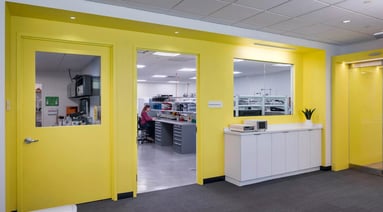
As the life sciences industry embraces constant change in technology, engineering, and ways of working, it is essential to understand the current market trends and challenges that impact the sector. With the pressure of moving products to market quickly, safely, and sustainably, the industry is evolving to meet the needs of today's consumers while remaining compliant with regulations.
Introducing Forefront
Forefront, our Unispace Life Sciences Global Benchmark Report is a comprehensive examination of the state of engineering delivery and maintenance in the life sciences industry. The report covers six key areas of focus:
- Engineering organizational structure
- Sustainability
- Pharma 4.0
- Equipment recapitalization
- Digital
- Maintenance
Many organizations are trying to advance and implement initiatives such as Pharma 4.0, digital initiatives and sustainability, while simultaneously operating in legacy manufacturing facilities and on platforms that require maintenance and recapitalization.
Through a rigorous research program that included surveying over 180 life science industry leaders, conducting interviews with blue-chip pharma companies, and hosting a roundtable discussion with the International Society for Pharmaceutical Engineering (ISPE), the report identifies best practices, trends, and insights from industry leaders on each of these topics.
Simply put, in a rapidly evolving life sciences industry, companies must adopt innovative practices to remain competitive. Our data and insights highlight the need for organizations to prioritize digital transformation, sustainability, and talent retention.
A holistic approach is key
One key trend outlined in the report is the increasing centralization of engineering organizations when deploying new technologies, digital initiatives, and key evolutions such as Pharma 4.0. This shift towards a centralized approach is necessary to optimize energy and material usage while reducing waste and enhancing sustainability. Additionally, the report shows that implementing electrical efficiencies and automating data flows are crucial investment areas for organizations. Streamlining processes and other critical functions can help sustain a growing or established company in the long run.
However, despite these positive trends, implementation of Pharma 4.0 reality remains nascent. Legacy production sites are lagging behind in terms of digital transformation and equipment recapitalization, with many engineers feeling hesitant to replace the status quo. Many companies don’t see issues with machines, processes, and organizational structure until it’s too late to correct. This issue is prevalent across the industry, and companies are focusing on data gathering, data integrity, and integration to bring these older operations into the same platform as global operations.
The war for talent
The industry is also facing challenges related to talent retention and talent acquisition. With a global strain in the market, employees at all levels are involved in a variety of initiatives to adapt and become more centralized. This approach enables organizations to focus on key initiatives and roll them out holistically, with teams being leveraged globally to share their thinking and focuses. This interdisciplinary approach also enhances the end product, creating a cycle of progress and innovation.
To address these personnel and technological challenges, companies are investing in pharmaceutical elegance as well as leaner, more agile operations through digital and data science applications. As the lines of leadership and responsibility blur, engineering professionals and leaders must step up and be at the forefront of innovation for new ways of working to succeed.
Adapting to change
The life sciences industry is undergoing significant changes, and companies must adapt to remain competitive. The adoption of innovative practices, such as digital transformation and sustainability initiatives, is crucial for organizations to optimize energy and material usage while reducing waste. Moreover, companies must focus on talent retention to attract and retain employees in a competitive global market. Organizational structure should also be rethought to draw on teams more effectively, reducing the wasted time that siloed teams usually brings about. By embracing these changes, pharmaceutical companies can stay relevant and continue to meet the evolving needs of consumers, while remaining agile and innovative in the global marketplace.
Download Forefront to learn more about how pharmaceutical organizations are evolving to meet the demands of today.


